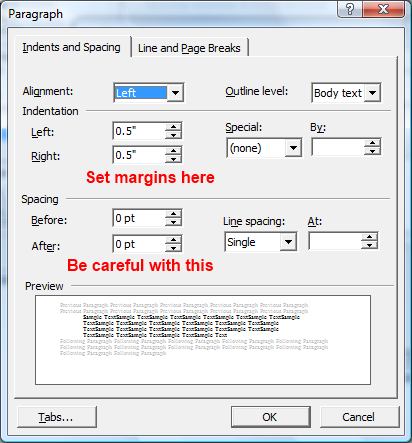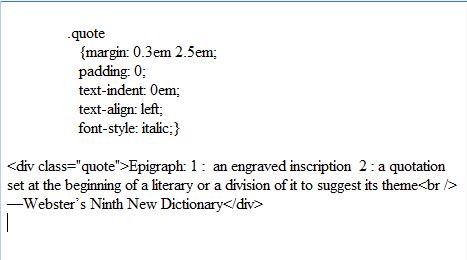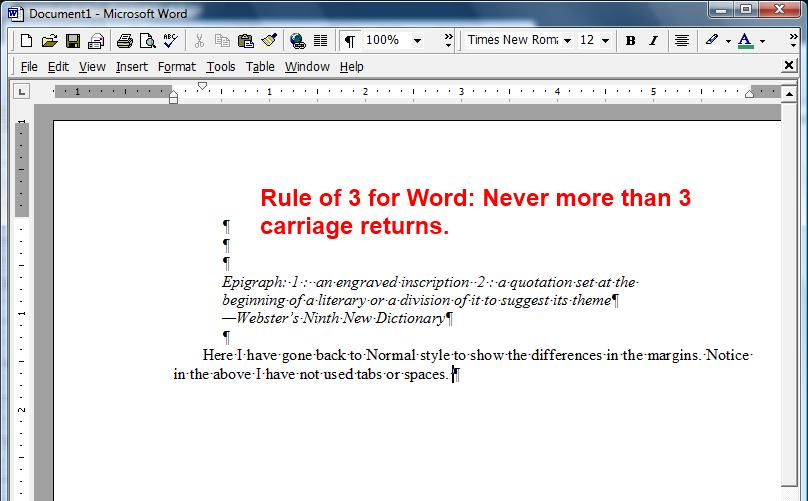First a word about Fair Use. Quotes can enhance your work. Snippets of poetry and song lyrics can add thematically to fiction. But their use can lead writers into areas filled with landmines and legal woes. Trad publishers have experience with the subject and copy editors look for instances that violate Fair Use. Self-publishers need to be aware.
Standford University Libraries have written an excellent guide to Fair Use and permissions. I suggest you familiarize yourself with the subject lest you find yourself on the receiving end of a nasty-gram from an attorney–quite possibly accompanied by a hefty invoice.
So, let’s say you have your legal ducks in a row and would like to insert an epigraph or quote in your ebook, or have a dedication page in the front matter. Here are some tips for making it nice.
IN WORD
Caution, if you use carriage returns and centering in an attempt to “fix” your text on the page, you could end up with unwanted gaps, blank pages or other uglies in the ebook.
Use a style sheet.
Make a style sheet for your project. Set up your paragraph format like this:
 If this style will only be used for the front matter, I suggest you set a ‘page break before’ in the style sheet. That will place the epigraph on its own page. You can also set the “Spacing: Before” at 12 to 18 pts to drop the text on the page. Don’t get carried away with that, especially if you intend to send this through the Smashwords Meatgrinder. Otherwise, use up to three carriage returns to move the text down.
If this style will only be used for the front matter, I suggest you set a ‘page break before’ in the style sheet. That will place the epigraph on its own page. You can also set the “Spacing: Before” at 12 to 18 pts to drop the text on the page. Don’t get carried away with that, especially if you intend to send this through the Smashwords Meatgrinder. Otherwise, use up to three carriage returns to move the text down.
Here is a simple css style class and the html:
 You can adjust the margins to suit your project. Under “margin” the first number controls the top and bottom, and the second is for the left and right. I like to left align short quotes because justification will sometimes stretch and distort the text.
You can adjust the margins to suit your project. Under “margin” the first number controls the top and bottom, and the second is for the left and right. I like to left align short quotes because justification will sometimes stretch and distort the text.
You can use the same stylings for dedications. This styling is also handy for offsetting poetry within the body of the work.
A last word about song lyrics. If you do receive permission to use song lyrics, you will need a permissions notice in your ebook. Put that in the back matter and make sure the artist receives full attribution. Example:
Song lyrics from “Love is an Epigraph” copyright 2013, JW Manus; used with permission granted by the artist.
Now go forth and make your ebook look nice.


Yes, like this. Just considering a new dedication and foreword for the re-release of Come Back to Me.
I’ll be talking about introductions and forewords in the next post. I love the darned things.
Always best to write your own epigraphs – including poetry. I you’re not prolific as a poet, it can still enhance a chapter to put a relevant poem of yours at the start. Emphasis on relevant.
I actually use the epigraphs in Pride’s Children to tell a part of the story, the external world. You can skip them – but you will miss little nuggets of useful information – and the attitude of two ‘generic’ group characters – who later turn out to have a big impact on the ending.
If anyone wants to see what WordPress I had to fight to get them to display in a semi-reasonable way, look at the beginnings of the first 6 chapters on the Pride’s Children tab on my blog. (http://liebjabberings.wordpress.com/prides-children/)
The ebook version will be under my control, as will the print version – and I know exactly what I want them to look like. WordPress free themes are a great gift – but not that friendly to format.
Thanks for the formatting tips – you’ve raised the quality bar for me. AND shown me how to do its Fosbury Flop. (sp?)
They look good, ABE. I know what you mean about WordPress. I have it on my list to upgrade this site and format it the way I want it to look. Other things keep taking priority.
I’m glad to raise the bar. I don’t know if I am having an effect, but I do notice quality of formatting going up overall. And that’s a very good thing. 😀
Jaye, have I got it right that, even for say, two lyric lines an author wishes to quote as an epigram in the front of the book, the same very stringent rules apply as for quoting lyrics within the main body of the text? I’d hoped epigrams might be exempt, somehow. Not true?
The rules are sort of arbitrary and much depends upon who owns the rights and what they consider fair use. Personally, I’d avoid any song lyrics, but if they are necessary and you are willing to run down permissions, go for it.
Were you reading over my shoulder yesterday? I have a short story that uses song lyrics and quotes from famous people! I’ll need to check out those fair use clauses and I wanted to set them off exactly the way you mentioned. Thanks for showing me how. 🙂
Quotes are pretty safe. In general, quoted material from a printed source that is less than 750 words usually falls under Fair Use. It should be properly attributed, but there’s no need to get permission for its use. Song lyrics and poetry, because of their length, are exceptions. You need to obtain permission to use them (Titles fall under Fair Use).
Worst case, you use a few lines from a song, the artist discovers it, and you get a letter from an attorney demanding that the work be revised or removed from publication. The artist would also be within their rights to demand compensation. You’d have no recourse except to comply.
As I understand it in the UK there’s no standard amount of prose you are able to quote under fair use terms, but this quote from the Society of Authors’ fact sheet on the subject is useful guidance.
“Some years ago the Society of Authors and the Publishers Association stated that they would usually regard as ‘fair
dealing’ the use of a single extract of up to 400 words or a series of extracts (of which none exceeds 300 words) to
a total of 800 words from a prose work…the quotation must be for criticism or review of that or another work.
While this statement does not have the force of law,it carried considerable weight with a judge experienced in
copyright in a leading infringement case.It does not mean, however,that a quotation‘for purposes of criticism or
review’ in excess of these limits cannot rank as ‘fair dealing’ in some circumstances.”